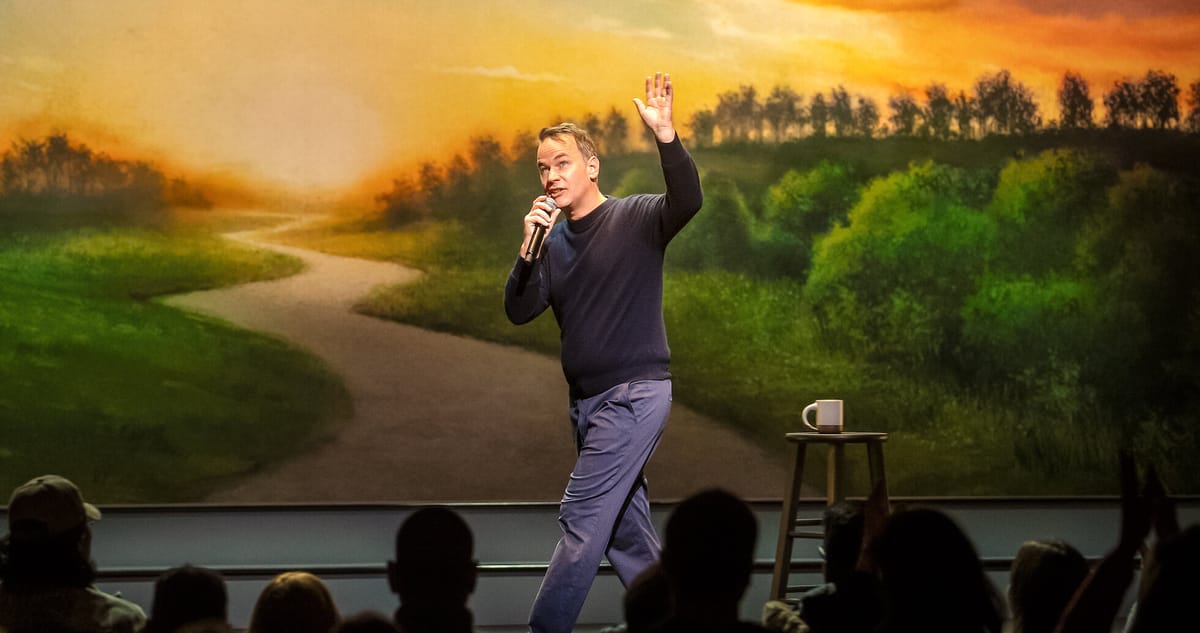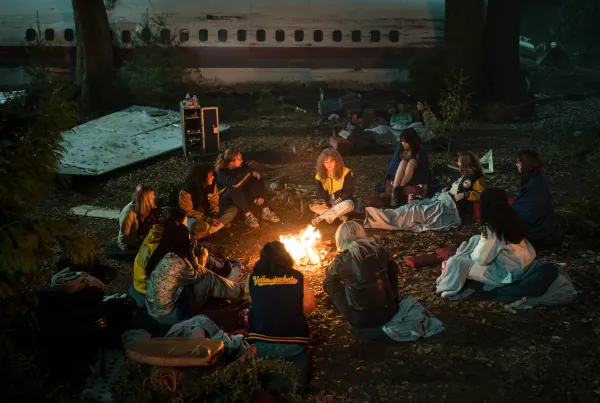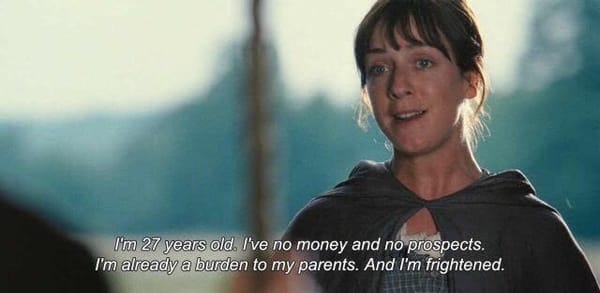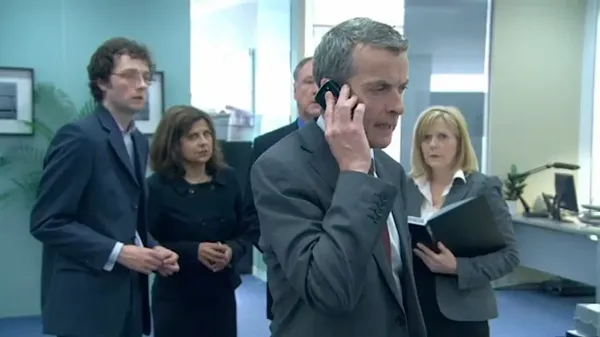Scriptnotes Recap: Episode 688, Writing Jokes with Mike Birbiglia

Mike Birbiglia is a Scriptnotes regular. He is the second most frequent guest after Aline Brosh McKenna (the Joan Rivers of Scriptnotes), making him practically a staple of the show, yet after two and a half years as producer this is the first time I’d actually been able to meet him in person. Mike jokes that comedians are always disappointing when you meet them in real life, but Mike is exactly the guy you expect him to be – personable and generous and effortlessly funny.
He joined us to talk about his new special The Good Life, but even after seven appearances on the show he was still dropping so many incredible insights into his process both as a comedian and as a screenwriter, that I figured it was worth highlighting a few of my favorites:
How Mike develops a joke
Mike: The jokes at the beginning are developed insofar as I’ve run them by friends who are comics. I always say, try to build a community of the people around you. I look around at the people who I started with, and we were all broke and struggling in our 20s. I look around and go, “Oh, they’re doing really well now.” There is a thing to creating your own community of people who are at your level.
People like Pete Holmes and John Mulaney are people who in my 20s were trying to figure it all out, and we would run jokes by each other. Now everyone has a really good career, but we still run jokes by each other.
Mulaney gave me a joke that ended up in the special. There’s a line where I go, “I’m a comedian. My wife is a poet. Together, we’re a sculptor.” I came off stage and he goes, “What about this? It doesn’t make sense, but what do you think?” I was like, “Yes, I’ll try that.” It somehow does make sense in the context of the special.
You start out with bouncing jokes off friends, which is what my whole podcast is. Then when you figure out something that you think is worth an audience seeing, you put it out there. Then I go on tour, and that’s really instructive bringing it to all different cities because you see, “Oh, this isn’t just a provincial sense of humor in New York City. This is something that plays everywhere,” or it doesn’t play. I think a huge part of being a comedian is figuring out what doesn’t work.
Taking your ego out of feedback
Craig: Does it ever hurt?
Mike: Which part of it?
Craig: When you’re like, “Okay, Mulaney, I’m going to run this [joke] by you,” and he just stares at you and says, “No.”
Mike: No, I don’t think that hurts. Not doing well with a joke with friends is hard in that moment. Not doing well with a joke on stage is hard in that moment. I think there’s an imperative to view it as, “I’m getting feedback for something that will be finished later.”
The wisest thing that almost anyone ever taught me is, my editor, Jeffrey Richman, who edited this special, he edited both of my movies. On both movies, I had moments in the edit where I go, “What are we going to do? This is a disaster.”
He just goes, “Oh, we’re not going to hand it in till it’s done.” It’s so simple of an idea, but I think that that’s all artistic process. You just don’t hand it in till it’s done.
Liz Gilbert who wrote Eat, Pray, Love, has this TED Talk that’s so good about the idea of not being a genius but having a genius, and holding it, and fostering it. That way it doesn’t become about you. That’s really key as a comedian. You can never think, “I am funny.” You have to think, “I want to create something that is funny for these people.”
Fudging the truth for a better story
Mike: When I was 12, I had hard nipples. Sometimes something happens during puberty. I was always a hypochondriac, so I thought it was cancer. I went to my dad– he’s a doctor– and go, “Hey, Dad. I have hard nipples.”
John: On your special you say, “Dad, I have cancer.”
Mike: I have cancer. He goes, “Why do you think that?” “I have hard nipples.”
Craig: I loved how calm he was. Why do you think that?
Mike: He’s a neurologist. No emotion.
I was like, “Well, see for yourself.” I take off my shirt. In the living room, he feels my hard nipples. Then he gives me the briefest medical diagnosis I’ve received to this very day. He goes, “Nope.” That was the end of the conversation.
Craig: What a comforting presence in your life.
Mike: This is a great example of when people ask me, “Are these stories true?” Sometimes they’re not true in small ways that you would never guess; When my dad felt my nipples, it was in his bedroom.
Craig: Oh.
Mike: I took it out [of the joke].
Craig: Yes, that’s smart.
Mike: I relocated it to the living room because the audience–
Craig: You don’t want them going where you don’t want them going. You want them going there a tiny bit, which is, LOL, my dad’s feeling me up. If he’s feeling me up in his bedroom, that’s not LOL.
John: What’s also crucial, though, is that you had already set up that your dad would come home from his two jobs and sit in his chair and read his war novels. You’re able pull it back to war novels. He sets down his war novel and puts his hands on your hard nipples. You already created the image for us, which is why it’s so much better than what it is.
Craig: Apparently we have the same dad.
Call the logic police
John: We talk on the show constantly about transitions and how you move from scene to scene. I’d seen your special on stage, but watching it filmed, I was very aware of when you’re transitioning from one idea to the next idea, from one tone to the next tone. You were able to pivot on such small spaces. Sometimes it’s a gesture, or a single word repeated. Are you writing that? Or is just how it works on stage as you’re feeling it out?
Mike: I would describe that as the final stage of the development in a two-year process. It’s probably the final six months. My director, Seth Barrish, is a dramaturg. He works through the script with me and the logic of the script. We’ll spend an extraordinary amount of time. He’ll go, “I don’t understand the connection between those two ideas.”
What Seth is doing is he’s making his brain blank over and over and over again, trying to imagine what it would be like as someone who’s never seen the show. Getting rid of the curse of knowledge. We have these long, drawn out conversations. I’m sure you guys deal with this in television and films all the time, which is, you’ll end up taking something that was 150 words, and then at the end of the edit, it’s four words. But those four words are the right four words.
Write (jokes about) what you know
Mike: I always tell people, one of the smartest things I did artistically was like 25 years ago, I had been doing: set up punchline, set up punchline, set up punchline, based on things in the news, things happening around town.
Then, at a certain point, I was like, “If I wrote about my own experiences, then no one can steal that idea.” Really, no one has that idea. No one’s lived that.
The thing about standup comedy and in relation to storytelling, is that the more you have examples of your experience of dealing with something, the more people can see themselves in the story. They’re not judging it as, “Oh, this is another guy or lady with a hard take on coyotes,” or whatever.
I always just try and think, “What’s the personal way in?” Because ultimately, by telling stories you are actually exhibiting a point of view. And because it’s in the form of a story, the audience isn’t as suspicious of the point of view.
Listen to the full episode here or anywhere you get your podcasts.
For our entire catalog of conversations like this, sign up to become a premium member at Scriptnotes.net




